Google Calendar could be better designed but it's hard to beat on features. AppleInsider investigates how well Google's calendar integrates with Apple's own.
If you spend your days in Gmail, Google Docs and, more recently, Google Keep, go get Google Calendar 1.7.5 for iOS and stop reading. It is that powerful a calendar app and it slots in especially well with all the other services from Google.
If you do not live in the G Suite, though, you should read on a bit further because things get tricky. It's not that the app suddenly loses its powerful calendaring features, it's that the experience isn't as rich as staying within the one system. It's also that issues you would readily put up and maybe wouldn't even notice do become more of an issue when you have only a toe in the Google world.
It is not possible to use this app without having at least a toenail in the this ecosystem because you absolutely have to have a Google account before the app will even start up fully. However, once you have that free account, Google Calendar for iOS works with both the company's own calendar service and with Apple's.
Just as Apple Mail is not a great choice for Gmail users, Apple Calendar is not brilliant for Google Calendar ones.
Still, if you go for Google Calendar on iOS without already being a G Suite fan, it will be because of this app's power features. They may even be enough to turn you into a Google fan.
Perhaps chief amongst Google Calendar's power features is that it's the only app we found that will do a form of automatic scheduling for you as an individual. It's similar to how Microsoft Exchange will scan the calendars of everyone in your company and say that you're all free for a meeting at 11:15 a.m. on Wednesday in three weeks.
Google Calendar doesn't do that, but it will look through your own personal calendar and then slot in times for what it calls Goals. These can be for fitness, as in you aim to run three times a week or you want to learn a new skill and keep putting it off because you're busy. Google Calendar asks what you want to do, prompting you through suggestions, and next how often you want to do it.
Then it will add times to complete these goals right into your calendar. You can adjust the times, you can reject them and the app claims to be able to learn from your preferences. Curiously, the only thing you can't do is chicken out part way. Once you've started adding a goal, there is no way to cancel or delete or give up until you've gone through the whole process.
Actually, deleting an event of any kind is slightly awkward. Unlike every other calendar app, you can't go into an event, scroll to the bottom and tap delete. Instead you have to tap to go into the event and then look for a small ellipses at top right. When you've looked back up to find that, though, Google Calendar asks if you're sure with a dialog box back at the bottom.
So you're looking up, you're looking down, you're just forever searching for the right button to press. Plus once you've said you want to delete it and yes, you're sure, then the event stays exactly where it is on your screen until you close it to go back to the main view. You can't help but keep on looking to see if there's a Very Delete button that you haven't noticed yet.
It's also slow, some a fault of performance, but mostly by poor user interface design requiring more taps than necessary. Here's a clue to how slow it is: once we had set up a whole series of test events in Google Calendar, we went back to Fantastical to delete them because there was less UI friction to do so.
There is another unique power feature, though. Google always scans through everything it can so Calendar parses the details of any new event you've entered. Then if there is an appropriate image, it will pop that in.
So instead of your lunch meeting tomorrow being a green rectangle in the middle of the calendar, it's instead a rectangle with an image in it. That could be an illustration such as a graphic of coffee or it might even be a photo of the actual venue.
Whether you like all this or not is a matter of personal preference, but it does brighten up the normally mundane calendar view. If you don't like it, however, that's your tough luck. Google knows best so there's no way to switch it off.
Similarly, Google Calendar takes you down a pretty specific and unalterable path when you're entering a new event but the way it does so is good. It's a hybrid of an old-fashioned list and the kind of natural language in which you tell your calendar about an event in the same way you would tell another human being.
Just, not all the time. Sometimes it is as if that natural language feature is simply switched off. That would periodically happen to us and the best we can determine is that it's down to when we used a certain setting.
There's a simple on/off switch that sets whether Google Calendar uses the calendar data that's already on your iPhone. We definitely lost the natural language feature when we used that switch — but not every time and not in a consistent way. Whichever way that setting was, we might or might not have this function.
Still, on a good day with the wind in the East and salt having been thrown in the right direction, it's an excellent feature.
As you start to write a sentence like "Lunch with Angela next Tuesday at Starbucks," then the moment you've written "Lunch" a drop down menu appears with all the words you're likely to write next. So there's "with," "at," "on" and so forth. You can tap one of those or just carry on writing.
It usually recognizes "Angela" as a contact, though that's something else we found might or might work. It does recognize Starbucks as a venue and then nicely offers the addresses of a couple of nearby locations.
In some ways, that venue insertion function is the best app feature, as throughout typing that whole line, if Google Calendar isn't suggesting words like "with," it's offering you locations. It's better at finding local ones than Calendars 5 or BusyCal are. It's better at finding them as you type than Fantastical is, but then that app beats it for useful accuracy when you later go back to look up this new event.
Google Calendar's locations are powered by FourSquare, and when we would try someplace like Starbucks which has far too many locations, it would always offer us two that were fairly close but weren't actually the closest. Potentially they were the most popular, given where they were, but we are entering an appointment and not asking for reviews.
Strangely, if you skip picking a venue and instead go back later to add one, the app does better. It offers more choices and in our Starbucks example included the nearest.
Only, one of the very handiest things about calendars including an address is that you can tap on it and go straight to Maps with the directions waiting for you. Naturally, when you tap on a location within Google Calendar it shoots you off to Google Maps instead of Apple Maps. Unnaturally, though, it can then fail.
You can get Google Maps displaying the error 'No results' even though it's just been passed the result that Google Calendar successfully found.
This is the kind of thing that makes Google software exasperating: features that sound fantastic in theory are letdowns in practice. To be fair, though, this isn't common and every Google app has features no one else does. The problem is usually in finding how to make them work.
Yet, that is actually another reason for sticking within the Google world: the way the design hides what you need is at least consistent, so if you know one app, you'll figure out the rest.
We keep referring to the iOS app but Google Calendar is really an online service with this supporting iPhone and iPad software. That's a significant issue because there is no equivalent app on the Mac.
Instead, you have to use the service online in a web browser, get a third party app, or have Apple Calendar sync with it. None of these are great options.
Online connections are fine, for instance, until you can't get a signal. Apple Calendar is fine and even very good, but it doesn't support all of Google Calendar's functions. You can't set those Google Goals from within Apple Calendar, for instance. Then there are third party Mac apps that connect to Google Calendar. When you've worked through the several hundred of those, let us know if any of them are any better than Apple Mail.
Just as Apple Mail is not a great choice for Gmail users, Apple Calendar is not a brilliant option for Google Calendar.
We started by saying if you like Google's apps already, just go get Google Calendar for iOS and stop reading. If you don't live within Google's ecosystem, it's not quite the opposite of what you're used to, but it's close. Though you shouldn't dismiss Google Calendar for iOS, alternatives like BusyCal and Fantastical work better across iPhone, iPad and Mac.
Google Calendar 1.7.5 requires iOS 9.0 or higher and is free on the App Store.
 Mike Wuerthele
Mike Wuerthele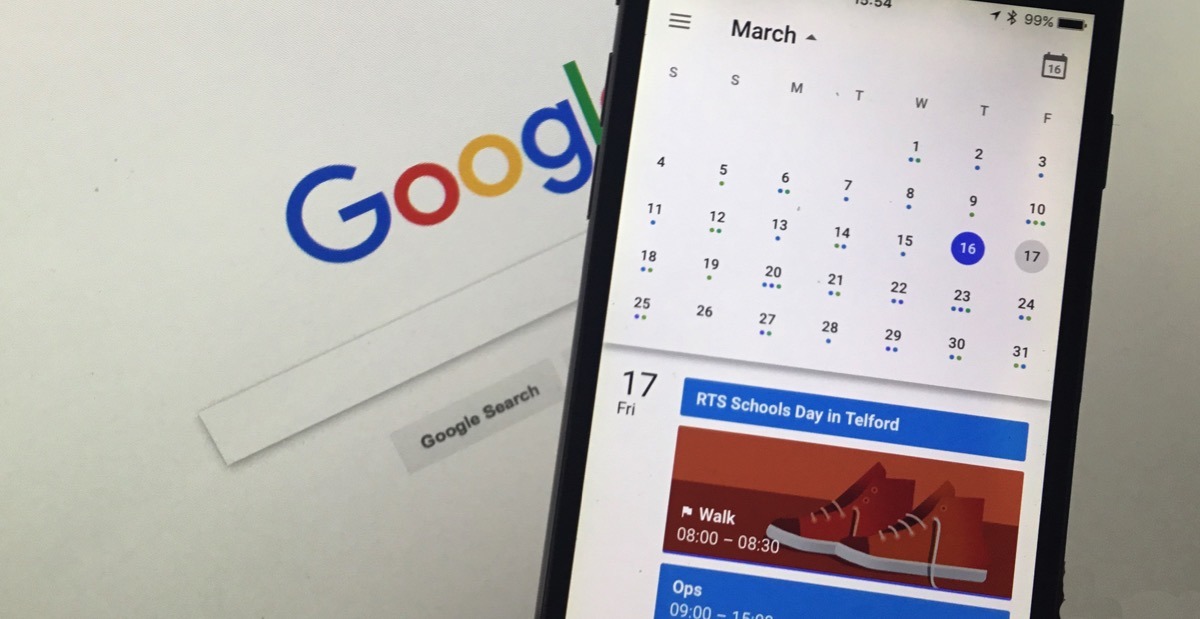
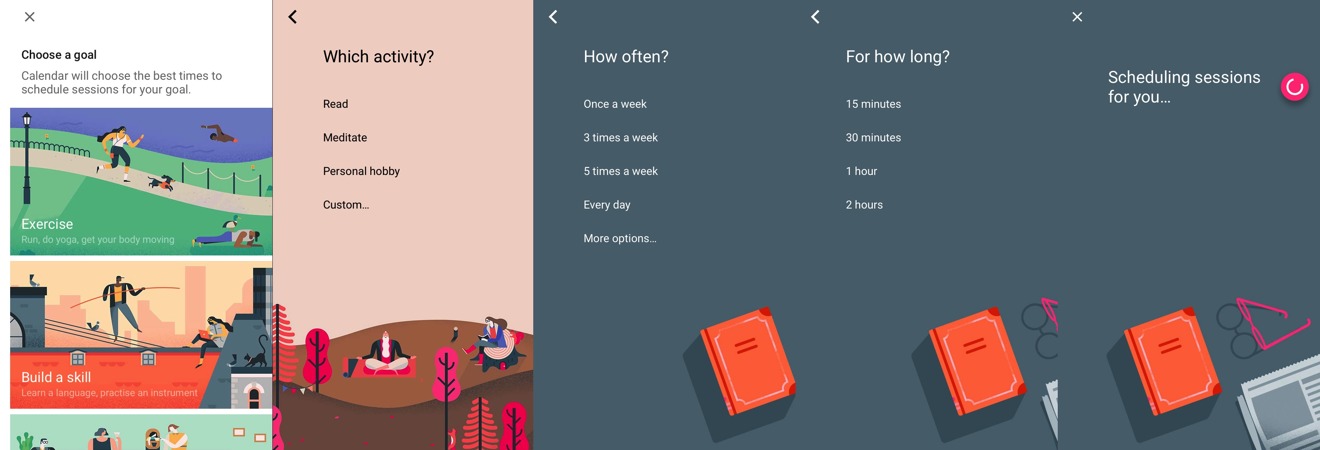
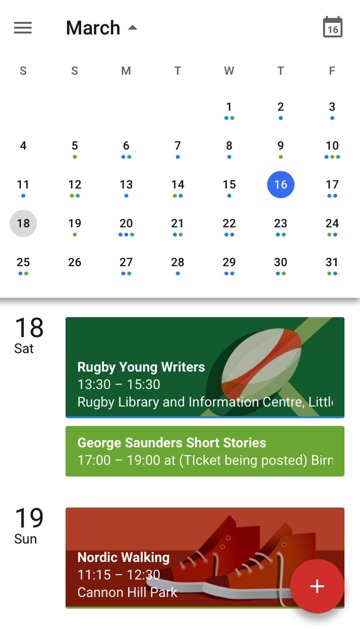
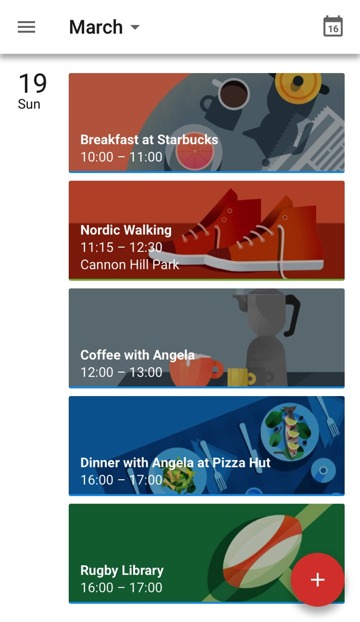







-m.jpg)






 Christine McKee
Christine McKee
 Malcolm Owen
Malcolm Owen
 Amber Neely
Amber Neely




 Chip Loder
Chip Loder

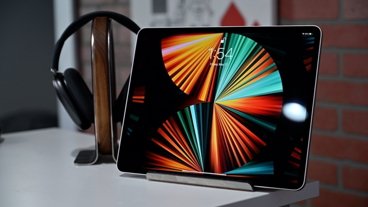







21 Comments
Still no facility to search, then? You'd think Google might be able to do that, even on mobile.
Not sure when Apple updated calendar App ? Lowest featured 3rd party calendar app like WeekCal on IOS in it's simplest version was better App than Apple's calendar App on IOS. I understand Apple wants 3rd party apps to proliferate and grow while Apple providing rich IOS platform. But, Apple IOS built-in Apple calendar needs enhancements. Every year there is new IOS version, there should be some enhancements to the built-in Apps like Calendar,iMessage, Reminder, Notes, etc.
I think it's a bit unfair to criticise Google because Apple doesn't let it integrate better in the Apple Ecosystem. I'm still at Apple Calendar but it can be very frustrating. Between Siri being unusably stupid to create appointments, the complete failure of looking up venues and locations, and the unreliable "time to leave" notifications, make it a very poor user experience. I don't get why people are not complaining about it more. Maybe because most switched to better alternatives like Google calendar?